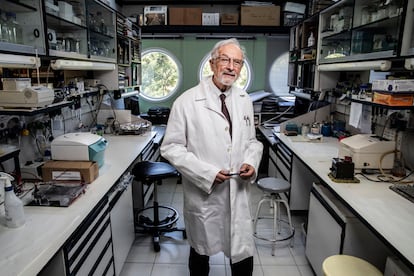Virologist Luis Enjuanes: ‘The situation in China is worrisome and will have a cascade effect on the rest of the world’
The Spanish researcher believes that the Asian country has made a mistake in going from a zero-Covid policy to a nearly unrestricted one, as its population has low vaccination coverage

Three years after the coronavirus pandemic began, the world has once again become concerned about China. The explosion of cases that the Asian giant has recorded after it abruptly ended the zero-Covid policy, in effect since 2020, has worried many governments. The question is how an uncontrolled increase in infections in a country with over 1.4 billion inhabitants will affect the rest of the world. Luis Enjuanes, the director of the coronavirus laboratory at Spain’s National Center for Biotechnology (CNB-CSIC), is a leading international expert on such situations.
Question: What is happening in China?
Answer. Well, there has been no middle ground. They have gone from isolating all the residents in a building because of a [single] positive case to virtually letting the virus run rampant in a population that is not well immunized.
Q. And that is not advisable.
A. No. The result is that, according to some sources. about 35 million people are infected a day. That’s a huge number, which can only be explained if we take two things into account. The first is that the restrictions [that China has] imposed over the past three years mean that very few people have spread the disease naturally. The second is that China’s vaccination coverage rates are lower than [they are] in Europe… and their vaccines are less effective as well. All of that means that the population is poorly protected against the virus. As a country, China should have done what the rest of the world did: gradually re-open as the population of vaccinated individuals increased and keep some restrictions [in place] for as long as necessary. [China] has gone from one extreme to another.
Q. Has applying the zero-Covid policy for so long essentially meant that China postponed the point at which the country had to confront Covid-19 in earnest?
A. Yes.
Q. But that wasn’t difficult to foresee. China is also a scientific powerhouse. Didn’t the country’s experts warn that this could happen?
A. China is also an authoritarian regime, a country that strictly disciplines a population used to obeying. At the beginning of the pandemic, the Chinese government retaliated against doctors; that’s what happened in the famous case of an ophthalmologist who, with the best of intentions, simply warned that a new virus was spreading. That is how dictatorships are, and the lack of freedom always works against the population.
Q. How worrisome is all this for the rest of the world?
A. It is worrisome.
Q. As worrisome as three years ago?
A. We are much better prepared [now]. There are many contagions, which means that there will be many more mutations, and new variants will emerge. This will have a cascade effect on the rest of the world. More infections always lead to more serious cases and more deaths, and that implies additional risks. However, it is also true that the new variants tend to be more attenuated forms of the virus.
Q. Why is that the case?
A. If the virus kills you or makes you very sick, they bury you or isolate you and the virus can no longer spread. On the other hand, if you can continue to live a relatively normal life, you are going to spread [the virus] everywhere. It is a natural process; on a large scale, that means that ultimately the more attenuated forms [of the virus], which cause milder cases, always end up spreading more. The Omicron variant causes less severe cases than Alpha or Beta.
Q. Wasn’t Omicron milder because of the effect of the vaccines?
A. Yes. A population’s protection against a virus depends on many cumulative factors. In Europe, we have seen that [happen] with the Omicron variant. It was generally milder than Alpha or Beta, but it still caused many serious cases and deaths among the unvaccinated and immunosuppressed populations.
Q. But there are viruses that do not become milder over time, such as measles and smallpox.
A. Those viruses are DNA; [they’re] larger and more stable. They mutate much less and cause a different type of systemic infection. That’s why being vaccinated or having had the disease once means you are protected for life. I was vaccinated against smallpox over 60 years ago, and I am still protected against it. Coronaviruses and influenza viruses are RNA and mutate much more.
Q. You said that the tens of millions of infections in China are going to have a cascade effect on the rest of the world.
A. Yes, and again we have vaccines to thank [for protection]. The new [vaccines] have a double function. They protect us against the early forms of the virus, which is necessary because [the earlier strains] would re-emerge otherwise. The vaccines also [protect] against the recent [variants], such as the new forms of Omicron. This is necessary because we know that protection against serious disease from the first doses declines over time, especially among older people and those with weakened immune systems. That’s why these new booster doses are so important. It’s like a race.
Q. What do you mean by that?
A. The body develops antibodies and T-lymphocytes against the form of the virus that infects it or the vaccine it receives. These defenses are tremendously effective in the beginning, but over time and as new variants appear, they lose that efficacy. And then the time comes when the virus infects you again. And then you develop new antibodies... And so on and so forth.
Q. The virus is supposed to become milder, and it will end up being like a cold.
A. Not necessarily. It could be like the flu, which for many people is not mild, and every year they have to get vaccinated again. There are things we don’t know yet.
Q. Does it make sense to require negative Covid-19 (PCR) test results from travelers who come from China, as some countries are doing, even when the virus is still spreading around the world?
A. Yes, that’s a standard public health measure that’s done in uncertain situations. You don’t mandate a quarantine or prohibit people from crossing the border, but you do exert some control in a situation where you don’t know very much about what is happening in China or you are not sure that you’re being told everything.
Q. Beyond China, what is the biggest challenge that the virus currently poses?
A. Long Covid. Studies in the US say up to 20% of people suffer some kind of ailment that doesn’t go away after their infection. According to studies in other countries, the percentages are lower but still significant. That’s a huge challenge that countries will have to confront.
Sign up for our weekly newsletter to get more English-language news coverage from EL PAÍS USA Edition
Tu suscripción se está usando en otro dispositivo
¿Quieres añadir otro usuario a tu suscripción?
Si continúas leyendo en este dispositivo, no se podrá leer en el otro.
FlechaTu suscripción se está usando en otro dispositivo y solo puedes acceder a EL PAÍS desde un dispositivo a la vez.
Si quieres compartir tu cuenta, cambia tu suscripción a la modalidad Premium, así podrás añadir otro usuario. Cada uno accederá con su propia cuenta de email, lo que os permitirá personalizar vuestra experiencia en EL PAÍS.
¿Tienes una suscripción de empresa? Accede aquí para contratar más cuentas.
En el caso de no saber quién está usando tu cuenta, te recomendamos cambiar tu contraseña aquí.
Si decides continuar compartiendo tu cuenta, este mensaje se mostrará en tu dispositivo y en el de la otra persona que está usando tu cuenta de forma indefinida, afectando a tu experiencia de lectura. Puedes consultar aquí los términos y condiciones de la suscripción digital.









































